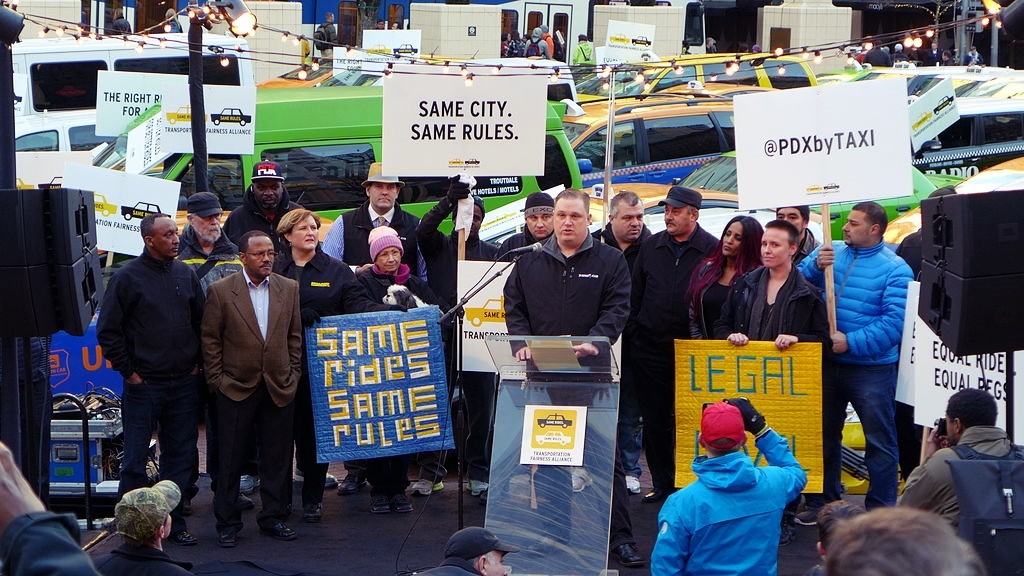Uber is an app that has revolutionized the taxi industry in the USA. With the help of smartphones, Uber allows drivers to receive information on potential customers and pick up passengers whose destination is suitable for them. Established in 2009, today this business is valued at around $50 billion and its great success lies in the simplicity of the business model. Anyone can become an Uber driver in the USA, but is it so simple in Europe?
No, the situation in Europe is different. This June, the long-lasting tension between French taxi and Uber drivers erupted into violent riots. As 19th c. luddites have been fighting against innovation by destroying machines that increased the productivity of the textile industry, French taxi drivers are now smashing their competitors’ cars. Given this, the French Minister of Internal Affairs has ordered police and prosecutors to seize the activities of Uber. Germany, Spain and Belgium have also turned a blind eye to the fact that Uber services are customer-friendly and put forward their own restrictions.
What is it that Uber has to anger taxi drivers and governments while being the customer’s choice at the same time? The answer is simple. It is the price and convenience that make it successful. The platform is designed for both professional and any other driver. With the help of the app, anyone driving home may find a fellow traveler who will contribute to the trip with a couple of Euros. Some drivers simply choose Uber as it helps to find clients or companions. Therefore, the prohibition to use this app equals to that of the prohibition of Facebook car-pooling groups such as “Vilnius-Klaipėda-Vilnius”.
Let us look deeper into what makes politicians and taxi drivers so angry over Uber and thousands of satisfied customers. Firstly, this idea has revealed the absurdity of government regulation and its influence on taxi fares. Although the services provided are the same, Uber drivers work as freelancers while other taxi drivers must receive permits from the authorities. It is especially felt in the biggest metropolitan cities as these permits are quite expensive. For example, a single license in France is as expensive as €240. Moreover, in 2011 taxi license prices in the New York auction have reached incomprehensible heights of $1 million.
So what creates this lack of taxi drivers and makes taxi licenses and services expensive? It is nothing else than a state monopoly created for those who can afford licenses. In other words, it is yet another way for governments to cash in.
Moreover, rather than seeking compromise and reducing the regulatory burden, governments find even more incomprehensible arguments against Uber. It is claimed that passenger safety can only be ensured by controlling the number of taxi drivers. Of course, there are cases when customers have been the victims of Uber drivers, but it does not mean that taxi services are absolutely safe. For example, although Uber is illegal in Belgium, as many as 23 rape cases where passengers became victims of taxi drivers have reached the court recently. Therefore, it is evident that state licensing of taxi drivers is far from making services safer.
Uber will come to Lithuania as well. It is unavoidable and we should think of how to prepare the market for cheaper transportation services. Firstly, we should not create artificial barriers and understand that such business is completely normal. It should not pose problems since Lithuanian taxi market regulation is not so stringent as compared to other countries and some of the drivers already work as freelancers. Moreover, taxi licenses in Lithuania are inexpensive thus Uber prices will not be a shock to the current drivers.
Secondly, we should think about creating legal framework suitable for such businesses. Uber is only one of many examples. Other businesses such as Lithuanian Dalinuosi.lt or Airbnb are already working on the basis of the same principle. These sharing economy-based businesses should not be regulated as strictly as well-established markets. Artificial barriers would kill such initiatives in their early stages of maturity.
Finally, service providers that use such platforms should not face any barriers to pay taxes and act legally. The entirety of all these elements would allow a successful competition between taxi and Uber drivers in Lithuania as well as imply a possible success for other sharing economy-based business models.



